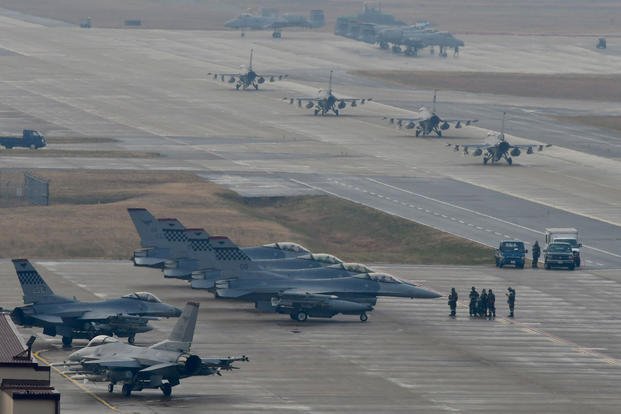The Defense Department suspended one of its largest annual aviation exercises with South Korea in light of ongoing discussions between the two Koreas.
Officials on Friday said Defense Secretary Jim Mattis and his South Korean counterpart agreed "to give the diplomatic process every opportunity to continue" and canceled Exercise Vigilant Ace, which had been scheduled for December.
Vigilant Ace has been held for the last nine years to "enhance interoperability between U.S. and [Republic of Korea] forces and ensure local peace and security," according to the U.S. Air Force.
Last year, the U.S. sent its most advanced stealth fighters -- the F-22 Raptor and F-35 Joint Strike Fighter -- to the Pacific for the exercise.
Related content:
- No Plans to Cancel More Military Exercises with South Korea: Mattis
- US, Allies 'Blitz' Korea with Massive Air Power Display
- Mattis Makes It Official: No More Military Exercises With South Korea
A massive force totaling 230 aircraft participated in the U.S.-led drills at Osan Air Base, focusing on interoperability, security and combat air power, the Air Force said at the time.
Two dozen stealth fighters, including six F-22 twin-engine jets, six F-35A single-engine jets and a dozen F-35B vertical takeoff versions, were present for the aerial training last year. The aircraft flew with F-16 Fighting Falcons, F-15 Eagles, F-18 Hornets, A-10 Thunderbolt IIs and EA-18G Growlers, as well as Republic of Korea F-15K Slam Eagles and F-4 Phantom IIs, according to the service.
The exercise was about training with allies and coordinating with fourth-generation aircraft, but it was also about messaging, a source told Military.com on background at the time.
That message was for North Korea, which last November said it had launched its biggest intercontinental ballistic missile to date -- the Hwasong 15 -- in a test that reportedly marked the highest and longest duration flight of any North Korean ballistic missile.
Relations between the U.S. and North Korea have appeared to be on the mend in recent months, with President Donald Trump noting his newly blossoming relationship with North Korea's Supreme Leader Kim Jong Un.
"I was really being tough and so was he. And we would go back and forth. And then we fell in love, OK?" Trump said at a campaign rally Sept. 29. "No really. He wrote me beautiful letters. And they're great letters. And then we fell in love."
The Defense Department announced in June, following the Singapore summit between Trump and Kim, that the U.S. had suspended larger exercises, notably Ulchi Freedom Guardian -- which Trump at the time characterized as "war games" -- but said smaller training efforts with South Korean counterparts would remain on the calendar.
The latest news comes after Mattis told reporters in August that the Pentagon wasn't planning to cancel additional exercises with South Korea.
"As you know, we took the step to suspend several of the largest exercises as a good-faith measure coming out of the Singapore summit," he said Aug. 28. "We have no plans at this time to suspend any more exercises. We will work very closely with [Secretary of State Mike Pompeo] and what he needs done, we will certainly do to reinforce his effort. But at this time, there is no discussion about further suspensions."
It is unclear if Vigilant Ace will be rescheduled for a later date, or if it will resume next year.
-- Oriana Pawlyk can be reached at oriana.pawlyk@military.com. Follow her on Twitter at @Oriana0214.











